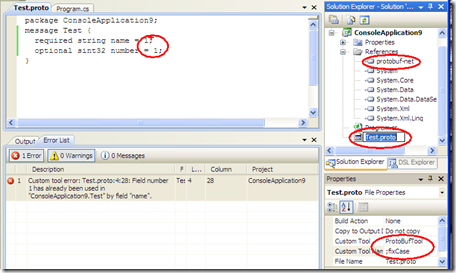I'm trying to use protobuf in a C# project, using protobuf-net, and am wondering what is the best way to organise this into a Visual Studio project structure.
When manually using the protogen tool to generate code into C#, life seems easy but it doesn't feel right.
I'd like the .proto file to be considered to be the primary source-code file, generating C# files as a by-product, but before the C# compiler gets involved.
The options seem to be:
I have struggled with 2) above as it keeps giving me "The system cannot find the file specified" unless I use absolute paths (and I don't like forcing projects to be explicitly located).
Is there a convention (yet) for this?
Edit: Based upon @jon's comments, I retried the pre-build step method and used this (protogen's location hardcoded for now), using Google's address-book example:
c:\bin\protobuf\protogen "-i:$(ProjectDir)AddressBook.proto"
"-o:$(ProjectDir)AddressBook.cs" -t:c:\bin\protobuf\csharp.xslt
Edit2: Taking @jon's recommendation to minimise build-time by not processing the .proto files if they haven't changed, I've knocked together a basic tool to check for me (this could probably be expanded to a full Custom-Build tool):
using System;
using System.Diagnostics;
using System.IO;
namespace PreBuildChecker
{
public class Checker
{
static int Main(string[] args)
{
try
{
Check(args);
return 0;
}
catch (Exception e)
{
Console.WriteLine(e.Message);
return 1;
}
}
public static void Check(string[] args)
{
if (args.Length < 3)
{
throw new ArgumentException(
"Command line must be supplied with source, target and command-line [plus options]");
}
string source = args[0];
string target = args[1];
string executable = args[2];
string arguments = args.Length > 3 ? GetCommandLine(args) : null;
FileInfo targetFileInfo = new FileInfo(target);
FileInfo sourceFileInfo = new FileInfo(source);
if (!sourceFileInfo.Exists)
{
throw new ArgumentException(string.Format(
"Source file {0} not found", source));
}
if (!targetFileInfo.Exists ||
sourceFileInfo.LastWriteTimeUtc > targetFileInfo.LastAccessTimeUtc)
{
Process process = new Process();
process.StartInfo.FileName = executable;
process.StartInfo.Arguments = arguments;
process.StartInfo.ErrorDialog = true;
Console.WriteLine(string.Format(
"Source newer than target, launching tool: {0} {1}",
executable,
arguments));
process.Start();
}
}
private static string GetCommandLine(string[] args)
{
string[] arguments = new string[args.Length - 3];
Array.Copy(args, 3, arguments, 0, arguments.Length);
return String.Join(" ", arguments);
}
}
}
My pre-build command is now (all on one line):
$(SolutionDir)PreBuildChecker\$(OutDir)PreBuildChecker
$(ProjectDir)AddressBook.proto
$(ProjectDir)AddressBook.cs
c:\bin\protobuf\protogen
"-i:$(ProjectDir)AddressBook.proto"
"-o:$(ProjectDir)AddressBook.cs"
-t:c:\bin\protobuf\csharp.xslt
Protocol Buffers (Protobuf) is a free and open-source cross-platform data format used to serialize structured data. It is useful in developing programs to communicate with each other over a network or for storing data.
What are protocol buffers? Protocol buffers are Google's language-neutral, platform-neutral, extensible mechanism for serializing structured data – think XML, but smaller, faster, and simpler.
Protocol buffers are a combination of the definition language (created in . proto files), the code that the proto compiler generates to interface with data, language-specific runtime libraries, and the serialization format for data that is written to a file (or sent across a network connection).
Why the name "Protocol Buffers"? The name originates from the early days of the format, before we had the protocol buffer compiler to generate classes for us. At the time, there was a class called ProtocolBuffer which actually acted as a buffer for an individual method.
As an extension of Shaun's code, I am pleased to announce that protobuf-net now has Visual Studio integration by way of a Custom Tool. The msi installer is available from the project page. More complete information here: protobuf-net; now with added Orcas.

If you love us? You can donate to us via Paypal or buy me a coffee so we can maintain and grow! Thank you!
Donate Us With